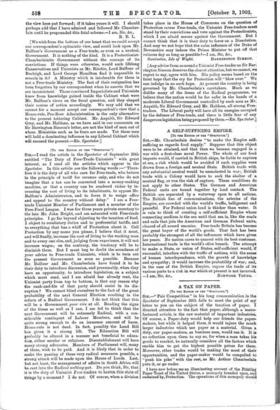A SELF-SUFFICING EMPIRE.
[To THE EDITOR OF THE "SPECTATOR"] SIR,—Mr. Chamberlain desires "to make the Empire self- sufficing as regards food supply." Suppose that this object were to be attained, and that then we became engaged in a war with a first-class naval Power. The whole of our food imports would, if carried in British ships, be liable to capture at sea, a risk which would be avoided if such supplies were drawn from a foreign and neutral State. British trade with any substantial neutral would be unmolested in war ; British trade with a Colony would have to seek the shelter of 'a neutral flag, or run the risk of capture. These conditions do not apply to other States. The German and American Federal units are bound together by land contact. The British are separated by a waterway open to all nations, The British line of communications, the arteries of the Empire, are crowded with the world's traffic, belligerent and peaceful. For Federal union land is thicker than water. It is vain to think of creating a self-sufficient Empire whose connecting medium is the sea until that sea is, like the roads and rails that join the American and German Federal units, cleared of all armed enemies. Free-trade Britain has become the great buyer of the world's goods. That fact has been probably the strongest of all the influences which have given her peace. No nation cares to quarrel with its best customer. International trade is the world's olive branch. The attempt to make a State, or union of States, self-sufficient would, if successful, interfere with the traffic of nations, with the sense of human interdependence, with the growth of knowledge and sympathy; it would increase the probability of war; and, in the case of the British Empire, expose the trade of WI various parts to a risk in war which at present is not incurred.


























































 Previous page
Previous page